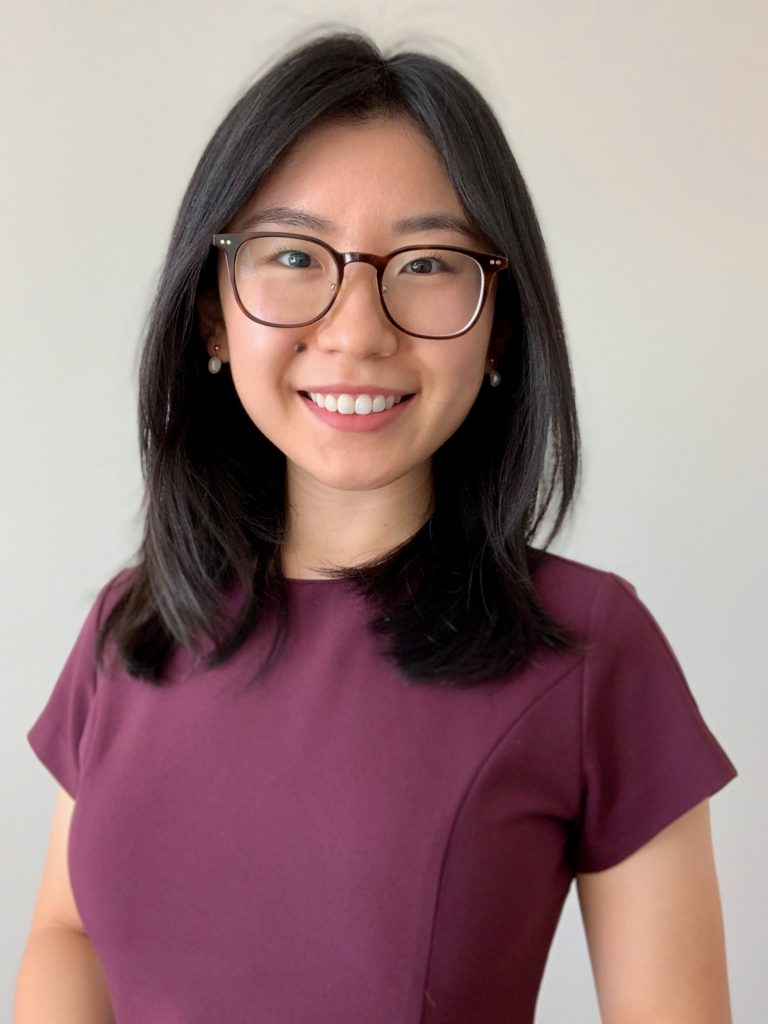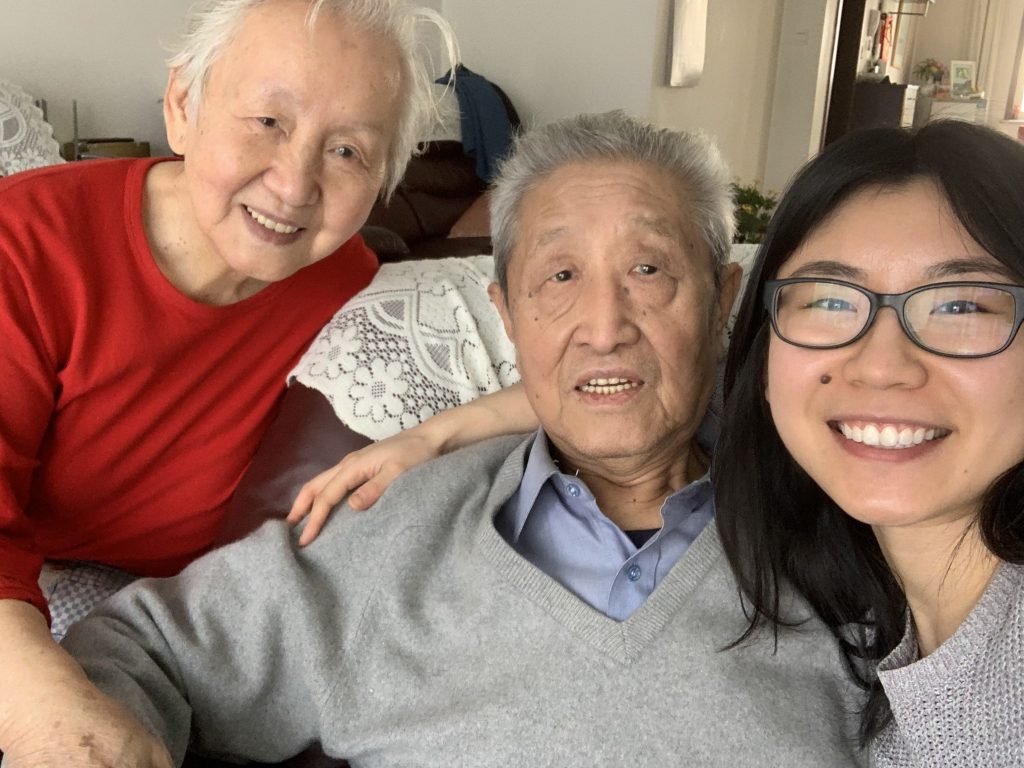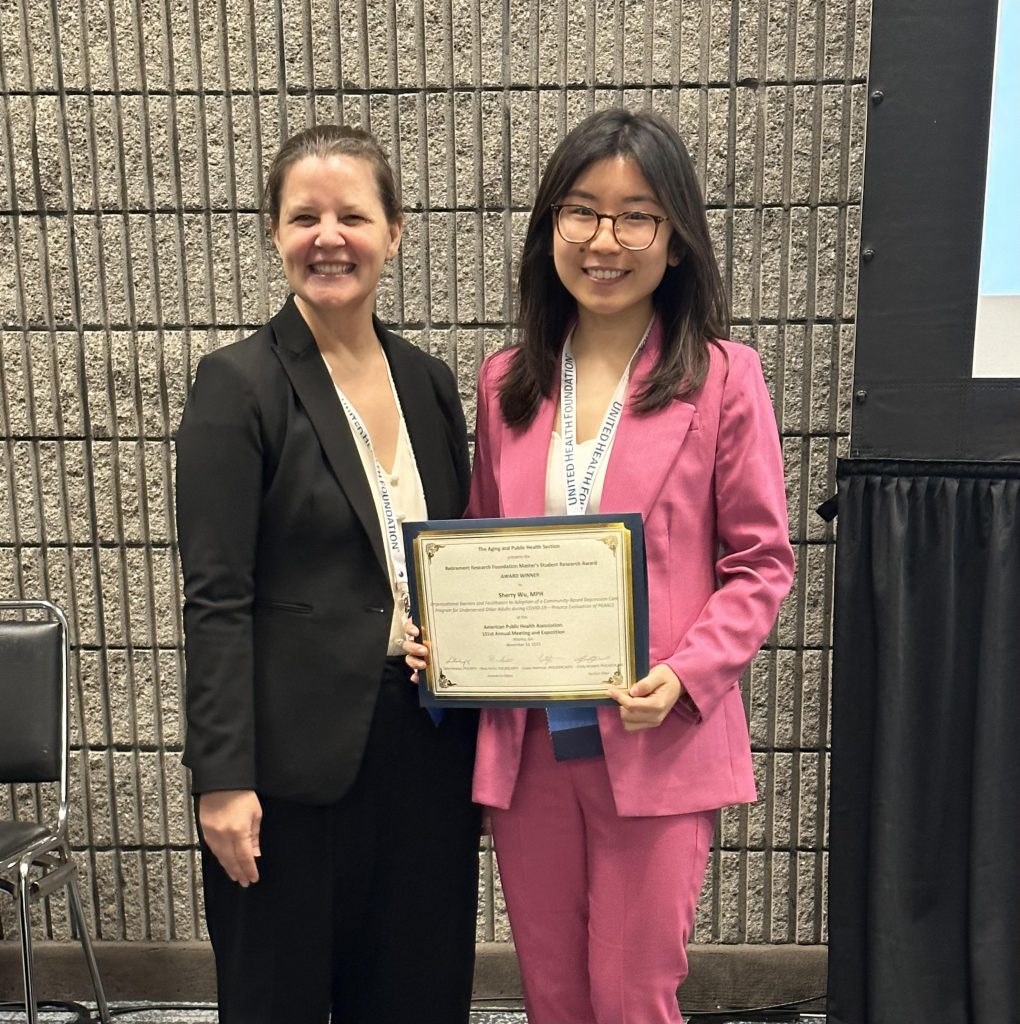
Sherry Wu, Research Coordinator within the University of Washington Health Promotion Research Center (UW HPRC) and alum of the Community-Oriented Public Health Program (COPHP) within the School of Public Health, has been awarded the 2023 Masters Student Research Award in Aging and Public Health by the American Public Health Association (APHA). This award “honors outstanding students for exceptional research” which “highlights aging issues and takes positive action in support of older adults.” The committee noted that her research was a “very strong submission that [stood] out above the rest.”
Inspired by her maternal grandparents, Wu originally pursued a career in social work. Working in Vancouver B.C., Wu witnessed how marginalized communities, like older adults, were often forgotten in COVID-19 pandemic efforts. This experience pushed Wu to pursue an MPH degree in order to make changes on an institutional and policy level.
In this Q&A, Wu describes her journey into public health, her capstone project, and why older adult mental health is a crucial part of public health.
What drew you to the public health field?

I grew up with my laolao and laoye (maternal grandparents) and it didn’t occur to me until years later how much their career and value influenced my path. My laolao (grandmother) was an outreach public health nurse in maternal and child health and my laoye (grandfather) was one of the first neurosurgeons in the northern port district in China where I grew up. They lived humbly and dedicated their lives to being of service to others. Following their footsteps, I also chose a career in healthcare.
I was initially trained and worked as a Registered Social Worker (RSW) in the mental health and substance use field in Vancouver, BC. As an RSW, I had the privilege of advocating alongside people who were unhoused in the city’s Downtown Eastside. I also conducted community-participatory research with im/migrant sex workers to document their experiences as evidence for legal and policy reform that would support their health and occupational safety. During the height of the pandemic, I joined a province-wide mobile crisis team that provided psychosocial support for frontline workers in long-term care, where I saw once again, how certain groups of people like our aging community, were forgotten.
I feel fortunate to have practiced in various social work roles which have allowed me to learn from and be in community with diverse groups of people. However, there was always a part of me that was itching to look beyond therapeutic interventions for research-informed solutions to address systemic barriers and root causes of health disparities. I decided to transition to public health to better advocate for changes at an institutional and policy level.
Why did you choose the UW for graduate school?
Coming to the US to study as an international student was a big decision to make. One factor in choosing the UW was the generous funding support the university provides for Graduate Research Assistants (GRAs) and Teaching Assistants regardless of your immigration status.
I also selected the UW because of its COPHP program. I wanted to not only gain new skills but learn in an environment where my past work and life experiences were honored and could be incorporated into the learning process. I was drawn to the program because it uses an equity and community-centered curriculum that puts theories into practice with projects that have real-life impact.
For example, one of my favorite projects was a formative evaluation guided by Dr. Derek Jennings in partnership with a Seattle-based senior center. We assessed the need and logistics of a virtual intergenerational connection program as a tool to increase social connection among older adults. We explored creative ways of dissemination and accessibility best practices to ensure research and evaluation data is accessible to communities beyond the walls of academia. Our class created a two-minute video explaining the project to help community members understand the research and findings.
Tell us about your capstone project. What impact do you hope it will have?

My capstone project partnered with the PEARLS Equity Project at UW HPRC to evaluate the contextual factors that impact the adoption of evidence-based programs (EBP) for depression care among older adults. PEARLS stands for Program to Encourage Active and Reward Lives. The PEARLS Equity Project focused on expanding depression care for older adults in underserved communities by partnering with organizations that are already serving and doing work with these communities. I was already working on the project as a GRA focusing on outreach and had the opportunity to conduct a process evaluation as my capstone project. I heard directly from organizations about what helps and hinders their ability to adopt an EBP like PEARLS. This research helped us better understand the contextual factors that impact their work and allowed us to incorporate their feedback to better structure our outreach, dissemination, and technical assistance. This work is part of a growing emphasis in implementation science which is necessary to truly center equity and community voices in our work!
From my previous social work experience and now partnering with community organizations in research, I feel more strongly than ever that the pandemic’s disproportionate effect on older adults cannot be properly addressed without understanding the gaps and strengths of the organizations that interact with them daily.
Why did you select this project/ what drew you to older adult mental health?
I sometimes feel that people go into mental health to heal themselves. We often have a personal connection to this field. Geriatrics work isn’t always glamourous but the folks I’ve met working in aging and mental health are very much in this field because they care so deeply about our elders and creating a better aging future for the older communities now and for generations to come.
Our society’s emphasis on productivity categorizes older adults as less desirable. But the experiences and wisdom of older adults are invaluable, and they have a right to fulfilling and healthy lives. Ageism and ableism are so damaging and so silently pervasive and they’re entrenched in our culture and societal structures. I wanted my project to do something about that because if we are truly talking about health across the lifespan in public health, we cannot forget about our aging population! And if we are also committed to addressing racism as a public health crisis, then we must also consider the diverse needs and experiences of our older adults and their caregivers and the underlying systemic issues that create disparities among communities of color and those with marginalized intersecting identities.
What is one piece of advice you have for potential new public health students or one thing you wish you knew before beginning your public health studies?
Graduate school is emotionally and mentally taxing. Make sure you create a solid support system, including self-care habits that you can lean on in times of need. Ask for help from family, friends, your cohort and professors and seek out campus support groups. I loved being part of the Procrastination and Perfectionism support group offered by UW Counseling Services. I really admired my groupmates’ vulnerability and compassion. We supported each other through some really tough times and celebrated the big and small wins too. It was one of the highlights of my time at UW!
What interests do you have outside of (or related to) public health?
I absolutely love swimming at community pools. I find the pool to be a place where I can quiet my mind. In my spare time, I also volunteer on the board of the Seattle/King County Coalition on Homelessness. When I’m not doing those things, you can find me frequenting local grocery stores and farmers markets to search for seasonal ingredients to recreate family favorites I grew up with. I find that cooking and sharing food is an opportunity to learn, persevere, and share my culture.
Wu received recognition for her award at the 2023 APHA Annual Meeting and Expo held in Atlanta, Georgia on November 12-15. Currently, Wu is furthering her capstone work with PEARLS Equity at UW HPRC, increasing accessibility to quality mental health care for older adults.